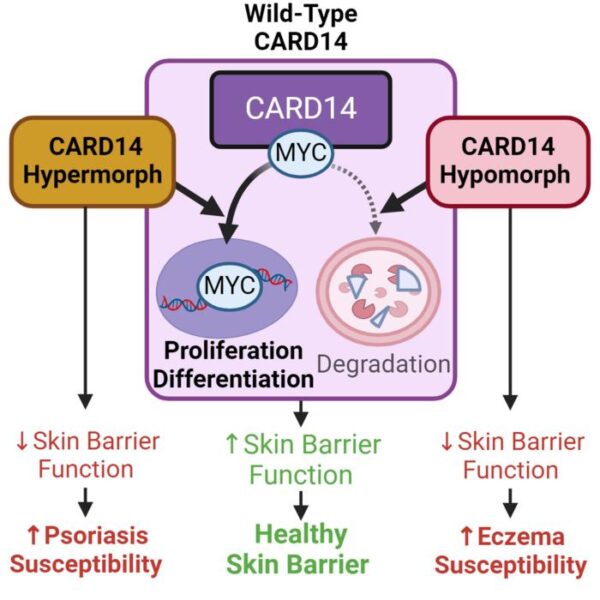Researchers at Cincinnati Children’s Hospital Medical Center have identified a previously unknown cellular pathway crucial for maintaining a healthy skin barrier. This discovery could lead to new treatments for inflammatory skin conditions like atopic dermatitis (eczema) and psoriasis, affecting millions worldwide.
Unveiling the CARD14-MYC Signaling Pathway
The study, published in Cell Reports on August 6, 2024, reveals a novel interaction between two proteins: CARD14 and MYC. This pathway plays a vital role in skin barrier function, which is essential for protecting the body against infections and other health threats.
Dr. Stanley DeVore, the study’s lead author, explains: “Our research discovered a previously unknown cellular pathway involving the protein CARD14. When this protein works properly, it keeps our skin barrier healthy, but when CARD14 is not working properly, it promotes the development of skin disease.”
The researchers found that CARD14 directly binds to and regulates MYC, a protein known for its role in cell growth control. When this interaction functions correctly, it helps maintain a healthy skin barrier. Conversely, disruptions in this pathway may contribute to the development of skin conditions like eczema and psoriasis.
Implications Beyond Skin Deep
While the focus of this research is on skin health, the implications of this discovery extend far beyond dermatology. Dr. Gurjit Khurana Hershey, the study’s corresponding author and director of the Division of Asthma Research at Cincinnati Children’s, notes that altered CARD14-MYC signaling could affect barrier function and allergic diseases in other tissues as well.
The researchers suggest that this pathway might play a role in conditions such as asthma by affecting airway tissue linings, or in eosinophilic esophagitis by impacting the digestive tract. Furthermore, given MYC’s association with cancer, the team speculates that dysfunctional CARD14-MYC signaling might contribute to certain types of cancer in epithelial tissues throughout the body.
Why it matters: This discovery opens new avenues for developing treatments for common skin disorders that affect millions of people worldwide. By understanding the molecular mechanisms behind skin barrier formation, researchers can work towards more targeted and effective therapies for conditions like eczema and psoriasis, potentially improving the quality of life for countless individuals.
The study builds upon previous research that focused on the CARD14-NFκB signaling pathway, which was thought to play a role in psoriatic diseases when elevated and in atopic dermatitis when reduced. However, this model didn’t fully explain the variability seen in CARD14-driven diseases. The newly discovered CARD14-MYC pathway provides a more comprehensive understanding of skin barrier health.
Dr. DeVore and his colleagues are now searching for small-molecule agents that can safely influence the CARD14-MYC pathway, with the ultimate goal of developing novel therapeutics. They have already included aspects of this study in a recent patent filing, highlighting the potential commercial applications of their findings.
As research progresses, the team plans to investigate which cancers might be affected by CARD14-MYC signaling. They will also present their findings at the 2025 Joint Conference of the American Academy of Allergy, Asthma and Immunology (AAAAI) and the World Allergy Organization (WAO) in San Diego.
This breakthrough underscores the importance of continued research into fundamental cellular processes. As our understanding of these complex pathways grows, so does our ability to develop targeted treatments for a wide range of diseases, potentially transforming patient care in dermatology and beyond.
If our reporting has informed or inspired you, please consider making a donation. Every contribution, no matter the size, empowers us to continue delivering accurate, engaging, and trustworthy science and medical news. Independent journalism requires time, effort, and resources—your support ensures we can keep uncovering the stories that matter most to you.
Join us in making knowledge accessible and impactful. Thank you for standing with us!

